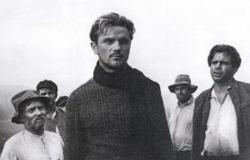“Fleeing war or repression, these migrants together changed the economy and cultural structure of this slow-moving medieval city of 600,000 people, reinforcing the image of Lithuania as an unlikely bastion of democracy,” write the text’s authors Anatolijus Kurmanaevs, Alina Lobzina and Tomas Dapkus
It is said that exiled Russian journalists in Vilnius set up studios to broadcast news to millions of their countrymen via YouTube. Hundreds of Russian activists have rented offices where they catalog the Kremlin’s human rights abuses, while exiled Russian musicians have recorded new albums for listeners at home.
The publication mentions the honoring of Alexei Navalny, who, according to the authors, drew attention to the difficult relations between Vilnius’ Russian-speaking diaspora and the Lithuanians who host them. Some Lithuanians are said to be worried that the economic and diplomatic benefits of this migration have come at the cost of increasing Russification in the small country, which during the Soviet occupation tried its best to preserve its language and culture.
As an example, a monument to the victims of the Soviet occupation is used, to which A. Navalny’s supporters laid flowers. The text states that for some Vilnius residents, this gesture usurped the memory of their homeland’s suffering in the Soviet Union. During that period, about 200,000 Lithuanians were deported to gulags or executed for taking up arms against the occupiers.
“The Russian language is everywhere again,” The New York Times quotes Vilnius University linguist and former Lithuanian culture minister Darius Kuolais. “It caused a culture shock for some Lithuanians.”
D. Kuolys noticed that the war in Ukraine forced the Lithuanian society to find a balance between maintaining traditions of tolerance and preserving culture.
At that time, the authors emphasize that the Lithuanian government, after the war in Ukraine started, closed its borders to most Russians, and continued to issue humanitarian visas to Russians who respect democracy.
“As a result of this selective policy, a community of educated, politically engaged and often wealthy Russian citizens formed in Vilnius, which greatly influenced the city,” the text reads.
Russian exiles told the daily that they have created a miniature version of democratic Russia around the baroque and gothic buildings of Vilnius Old Town.
“This is what Russia could look like without Putin,” explained Anastasia Shevchenko, an opposition activist from the southern city of Rostov-on-Don, who arrived in Vilnius after two years of house arrest.
It is said that apart from A. Navalno’s organization, which moved to Vilnius in 2021, most of the Russian exiles in Vilnius gathered in a community that helps them cope with the pain of exile and exchange ideas.
“When you walk in the city, you realize that you are not alone, and this is very important,” rejoices Aleksandr Pliushchev, who hosts the “Breakfast Show”, one of the most watched independent Russian news programs from Vilnius.
“Due to the small area of Vilnius and the concentration of notable Russian exiles in the affluent central districts, situations have arisen that sometimes resemble scenes from Anton Chekhov’s short stories,” the authors of the text describe the everyday life of Russian exiles in the capital.
Not all Russian activists adapted to life in exile easily, the text states. Many of them were forced to flee Russia in haste, leaving behind the wealth and sense of purpose that their work had given them. Most of the deportees interviewed say that their greatest concern is their remaining relatives, who they fear may become a target of the authorities in retaliation for their activities.
This anxiety has been exacerbated by the death of Navalny, who for many Russians living in exile was the best – perhaps only – hope for political change.
“I’m suffering, I’m in pain, I don’t know what to say when my daughter asks me: ‘Mom, what are we going to do now,'” Violetta Grudina, former organizer of A. Navalny’s province, who came to Vilnius after the war started, told The New York Times. According to her, Ukrainians are the biggest victims of the war, “but we also pay its price.”
It is emphasized that many newcomers use Russian as their main language, thus creating a complex cultural puzzle between the different ethnic communities of Vilnius, which are linked by a common history but separated by mutual historical grievances. Some Russian exiles, such as the pop artist Liza Gyrdymova, known as Monetočka, and the political activist Anastasija Shevchenko, told The New York Times that they are learning Lithuanian and trying to integrate into their adopted country.
But because Russian exiles are focused on the political struggle in Russia, most of them have neither the time nor the incentive to deepen ties with their host country, according to the text.
“Lithuanian authorities and citizens are watching the influx of prominent Russians with a mixture of curiosity and suspicion. Some called them White Russians, a sarcastic allusion to the failed movement led by traditional Russian elites against Soviet rule a century ago,” the publication notes.
The migration of Russian speakers to the city has sparked particularly heated local debates about education, according to The New York Times. About 11,500 students now study Russian in 14 Soviet-era schools in Vilnius – a 20 percent increase over the past three years, which, according to the officials interviewed by the daily, is worrying for a nation whose national identity has long been based on the Lithuanian language.
Vilnius Vice Mayor Arūnas Šileris stated that he fears that this trend will create a new generation of Lithuanian residents who speak only Russian, separating them from the wider society and making them more receptive to the revisionist rhetoric of V. Putin and Belarusian President Alexander Lukashenko.
“They do not perceive Lithuania as their homeland,” A. Šileris explained to The New York Times. “And that’s a threat.”






